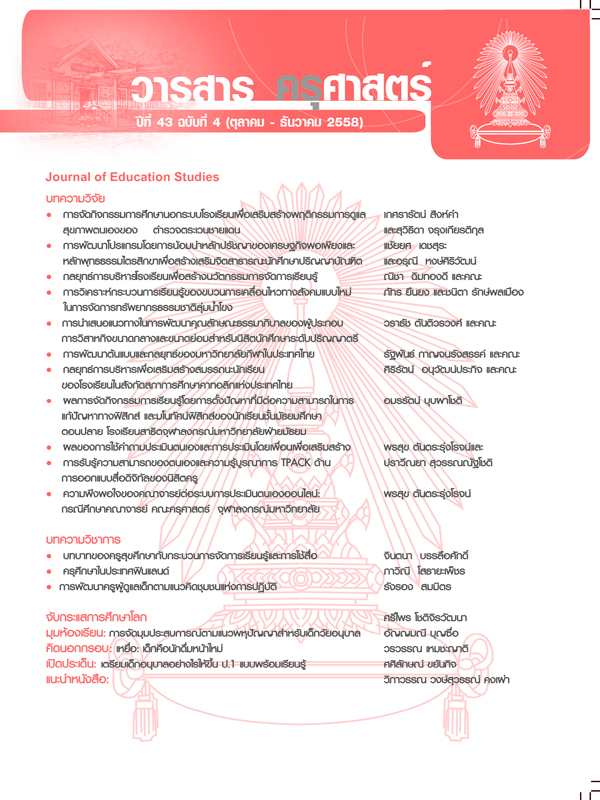การนำเสนอแนวทางในการพัฒนาคุณลักษณะธรรมาภิบาลของผู้ประกอบการวิสาหกิจขนาดกลางและขนาดย่อมสำหรับนิสิตนักศึกษาระดับปริญญาตรี
Keywords:
THE PROPOSED GUIDELINE OF CORPORATE GOVERNANCE CHARACTERISTIC DEVELOPMENT, SMALL AND MEDIUM ENTREPRENEUR FOR UNDERGRADUATE STUDENTS, การพัฒนาคุณลักษณะธรรมาภิบาล, ผู้ประกอบการวิสาหกิจขนาดกลางและขนาดย่อมAbstract
งานวิจัยฉบับนี้มีวัตถุประสงค์เพื่อ (1) ศึกษาสภาพปัจจุบันในการพัฒนาคุณธรรม จริยธรรม ธรรมาภิบาลให้กับนิสิตนักศึกษาระดับปริญญาตรีในมหาวิทยาลัย (2) ศึกษาสภาพปัจจุบันของผู้ประกอบการวิสาหกิจขนาดกลางและขนาดย่อมที่เกี่ยวข้องกับแนวปฏิบัติในเรื่องคุณลักษณะธรรมาภิบาล (3) เปรียบเทียบเรื่องการตระหนักและการรับรู้ในเรื่องแนวปฏิบัติที่เกี่ยวข้องกับคุณลักษณะธรรมาภิบาลระหว่างนิสิตนักศึกษาและผู้ประกอบการวิสาหกิจขนาดกลางและขนาดย่อม (4) นำเสนอแนวทางในการพัฒนาคุณลักษณะธรรมาภิบาลของผู้ประกอบการวิสาหกิจขนาดกลางและขนาดย่อมสำหรับนิสิตนักศึกษาระดับปริญญาตรีตั้งแต่ชั้นปีที่ 3 เป็นต้นไป เก็บข้อมูลโดยใช้แบบสัมภาษณ์และแบบสอบถาม กลุ่มตัวอย่าง ได้แก่ ผู้ประกอบการวิสาหกิจขนาดกลางและขนาดย่อมที่ได้รับรางวัลธรรมาภิบาลดีเด่นแห่งปี ระหว่าง พ.ศ. 2551 – 2557 และผู้บริหารของหน่วยงานภาครัฐและเอกชนที่มีบทบาทในการส่งเสริมแนวปฏิบัติที่เกี่ยวข้องกับธรรมาภิบาลให้แก่วิสาหกิจขนาดกลางและขนาดย่อมรวมจำนวน 10 คน วิเคราะห์ข้อมูลด้วยสถิติความถี่ ร้อยละ ค่าเฉลี่ย ส่วนเบี่ยงเบนมาตรฐาน และการวิเคราะห์เนื้อหา
ผลการวิจัยพบว่า แนวทางในการพัฒนานิสิตนักศึกษาให้มีคุณลักษณะธรรมาภิบาลของผู้ประกอบการวิสาหกิจขนาดกลางและขนาดย่อมควรได้รับการถ่ายทอดแนวปฏิบัติจากผู้ประกอบการวิสาหกิจที่ได้รับรางวัลธรรมาภิบาลดีเด่นแห่งปีในฐานะผู้ประกอบการต้นแบบที่มีประสบการณ์จริงฝังลึกอยู่ในตัวบุคคลและมีแนวปฏิบัติที่เป็นรูปธรรมเพื่อให้นิสิตนักศึกษาในบทบาทของเจ้าของกิจการสามารถปรับเปลี่ยนทัศนคติที่สมดุลระหว่างการแสวงหาผลกำไรทางธุรกิจและความรับผิดชอบต่อผู้มีส่วนได้ส่วนเสียในสังคมโดยผู้ประกอบการต้นแบบต้องมีความพร้อมที่จะถ่ายทอดประสบการณ์และสร้างสัมพันธภาพอย่างตื่นตัวกับนิสิตนักศึกษาผ่านกิจกรรมเสริมการเรียนรู้นอกเหนือหลักสูตรในสถานประกอบการจริง โดยเน้นแนวปฏิบัติที่ดีต่อ (1) พนักงาน (2) ผู้บริโภคหรือลูกค้าและคู่ค้า และ (3) สังคมและสิ่งแวดล้อม ที่ล้วนสัมพันธ์กับหลักธรรมาภิบาล 6 ประการคือ (1) หลักความรับผิดชอบตรวจสอบได้ (2) หลักคุณธรรม (3) หลักการมีส่วนร่วม (4) หลักนิติธรรม (5) หลักความคุ้มค่าและ (6) หลักความโปร่งใส
The purposes of this research are: (1) to study the current status of developing ethics and corporate governance for undergraduate students in university; (2) to study the current trends related to best practices of corporate governance and characteristic development of small and medium entrepreneurships; (3) to compare the awareness and recognition of corporate governance characteristics of small and medium sized entrepreneurs between students and entrepreneurs ; (4) to propose a guideline of corporate governance characteristic development of small and medium entrepreneurships for undergraduate students from 3rd year and beyond. Data collection methods consisted of interview forms and questionnaires. The representative samples are 10 of small and medium sized entrepreneurs who won the recipients of “The Outstanding Corporate Governance for Small and Medium Entrepreneur (SME) of the Year Award” between 2008 – 2014 and executives working in either the public or private sector who are responsible for promoting corporate governance characteristics to small and medium entrepreneurs. Data are analyzed by descriptive statistics including frequency, percentage, mean and standard deviation and content analysis.
The research found that the guidelines of corporate governance characteristic development of small and medium entrepreneur for undergraduate students should be directly taught from small and medium entrepreneurs who received the best of corporate governance entrepreneur for SME of the year award as the role model because these entrepreneurs have tacit experience and real practice that can motivate students to balance their attitude between the profitability and good corporate governance to its stakeholders. Also, these role-modeled entrepreneurs must show their willingness to share best practices and interact with students actively via the non-curriculum activity at the entrepreneurs’ factories or offices by using good practice toward: (1) employees (2) consumers or suppliers and (3) social and environment, which are related to the fundamentals of the six corporate governance theories of: (1) accountability, (2) ethics, (3) participation, (4) rules of law, (5) value for money and (6) transparency.




